What compels the reader to read your blog post? It’s a catchy blog post introduction.
A compelling blog post introduction attracts, engages and hooks the reader. It creates a slippery slide for the reader. The reader starts reading the intro and continues to the end of the blog post.
In this article, We discuss how to write a punchy blog post introduction. Its purpose and various blog post intro formulas. In the end, we will give you more tips for writing catchy introductions.
Here are the topics that we cover:
If you don’t have your own blog. Follow our step-by-step guide to start a blog.
What is a Blog Post Introduction?
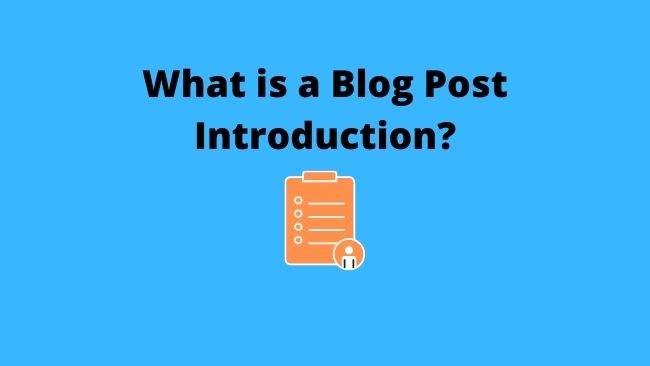
The blog post introduction is the first paragraph of a blog post. It’s the first thing the readers see after they click the headline. It provides the writer with an opportunity to grab the readers’ attention. So that the reader continues to read the rest of the blog post.
It provides the reader with an overview of the blog post. The reader gets an idea of what to expect from the content.
The introduction set the goal and tempo. It provides the reader with background information on the subject topic. In nutshell, the blog post introduction introduces the topic and summarizes it.
What is the Purpose of a Blog Post Introduction?
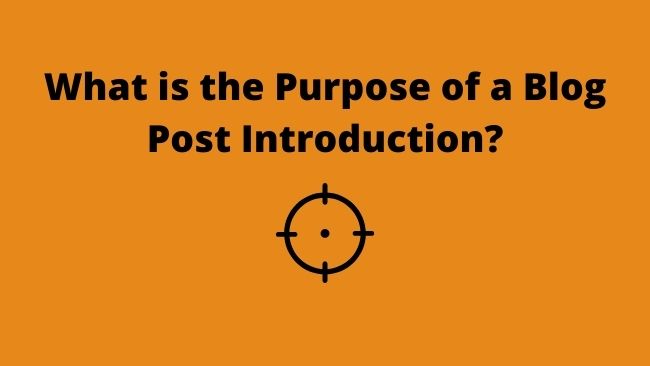
The main purpose of a blog post introduction is to introduce the subject to the readers. A good introduction helps in the following ways:
- Grabbing and keeping the readers’ attention
- Provides an overview of the topic
- Engages and encourages to read the complete article
- Explains relevance to the reader
- Sets the expectation of the reader
- States purpose of the article
- Gives you a central idea of the topic
- Provides background information
What are the Parts of a Blog Post Introduction?
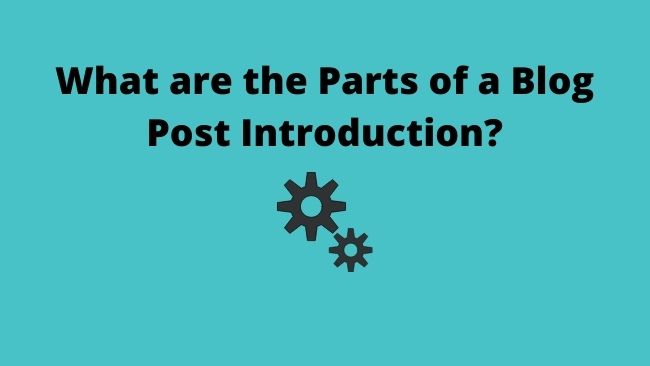
The article introduction should include at least 3 main parts. These parts are:
- A Hook
- Context
- Purpose/ Thesis statement
What is a Hook?
The hook is an opening sentence for grabbing the reader’s attention. It draws the reader’s attention so that they keep reading the article
Start the intro with a good hook. You can use a fact, quote, statistic, question or emotional statement.
What is the Context of Your Article?
The context of an article covers the importance of the topic you are covering. It can include some background information related to the topic.
You should include the main points that you will be covering in the article. Give a brief outline but don’t try to cover everything. Think of it as a teaser for things to come.
What is a Thesis or Purpose Statement?
A thesis statement sums up the central point of your article. It is at the end of the article introduction.
It provides a direction for your article and sets up the readers’ expectations. Thus it should be original, direct, clear and specific.
How To Write a Catchy Blog Post Introduction?
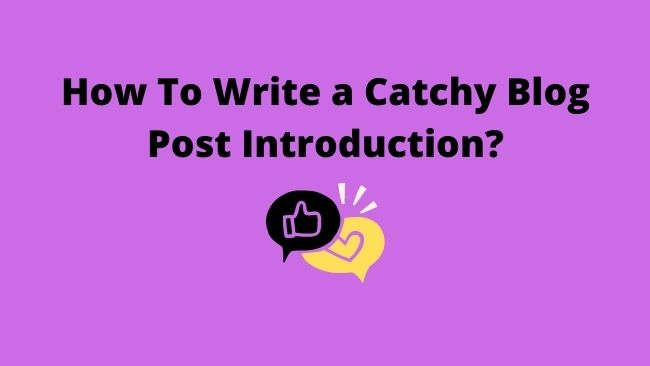
If you are a beginner and want to write catchy blog post introductions. Start with the blog post introduction formulas. These formulas provide you with a framework to craft attention-grabbing introductions.
The blog post introduction formulas are proven and time-tested. These formulas provide you with a template or outline to follow. It’s one of the quickest ways to come up with the best blog post introductions.
We have covered one such formula when discussing the parts of the blog post introduction.
Some of the other most popular introduction formulas are:
AIDA Formula
AIDA stands for Attention, Interest, Desire and Action. You start with an opening line to gain the reader’s attention. Keep the readers’ attention by generating interest.
Creating the desire so that readers to continue reading. Action inspires the reader to continue till the end of the blog post
PAS Formula
PAS stands for Problem, Agitate and Solution. In this case, you start with a problem your reader is facing. Next, you agitate the problem, highlighting the various forms the problem can take. And finally, provide the reader with a solution.
BAB Formula
BAB stands for Before, After, Bridge. In the first part, you describe the problem. Next, you describe the situation after the solution to the problem. Finally, in the bridge part, you tell the reader how to get to the solution.
After you get comfortable you can come up with your own formulas. E.g, a good introduction can be as simple as showing the proof. Hooking the reader and piquing his interest by showing the benefits.
Finally, you can use AI writing tools to write a blog post introduction. Give the AI writing tool the context of your blog post. It will write an introduction for you.
Additional Tips For Writing a Good Introduction
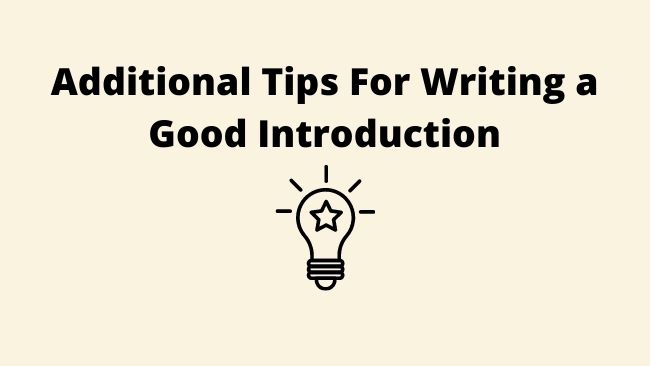
Here are some extra tips that will polish your blog intros:
Understand Your Audience
This is the first rule for writing compelling blog intros. You should have a deep understanding of your audience. It will help you address their fears and concerns, You will be able to relate to them and their emotions.
It’s the reason why you should create personas for your ideal readers/customers.
Start With a Short First Sentence
Start the blog post intro with a short first sentence. A short sentence that makes a point and adds punch to your intro.
A short sentence allows the reader to read, pause and think. Thus creating a stronger impact.
Use Templates
Templates are proven and time-tested formulas. We have discussed some of these formulas above. Search for more such formulas or you can create your own. This will help you in standardising your blog post introductions
Add Secondary Keywords For SEO
SEO is an important component of blog post writing. Include the focus keyword in the first paragraph of the introduction. Try to include secondary keywords in the next few paragraphs of the introduction.
Keep It Simple
The blog post intro should be concise and clear. Readers should reach the main content quickly. They are in hurry to scratch their etch.
When you promise the reader information in the headline. A lengthy introduction fades the curiosity you create with the blog title.
Use Simple Present Tense
Always use simple present tense in your blog post intros. As it describes a state or action that is happening now. It is useful in giving directions, and instructions to express future time.
Avoid Repeating Headline
Avoid repeating the headline in the blog post introduction. After keyword research include the keyword in the blog title for SEO. It is a good SEO practice to use it in the first paragraph. Instead of repeating the keyword, we repeat the blog title.
Repeating the same sentences looks unprofessional. Nobody likes to read the same sentences twice.
Make Use of You
If you don’t have the opportunity to use it in the body of the blog post. Ensure that you use it at least once in the blog post introduction.
Conclusion
A blog post introduction is the first thing that a reader faces on your blog post. So, you should come up with a catchy intro that hooks the reader for reading further.
The primary need for solid introductions is to understand your audience. Create your ideal reader persona. Write as if you are writing for that single person.
If you find it difficult to come up with blog intros. You can use the blog post introduction formulas. These are proven and time-tested formulations that work.
Once you get the hang of writing impressive introductions. Use the extra tips for further improving upon your blog post introductions.
How are you planning to write your blog intros? I would love to hear your views !!!

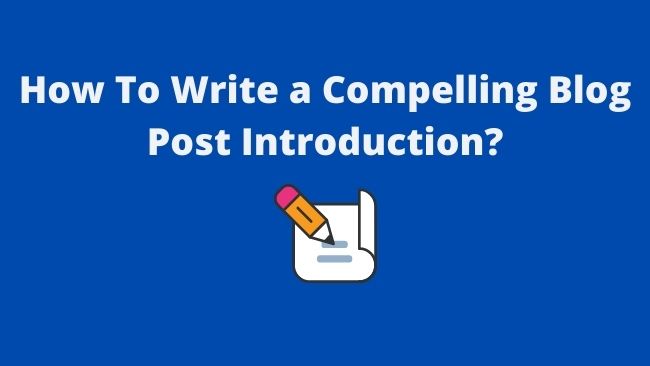
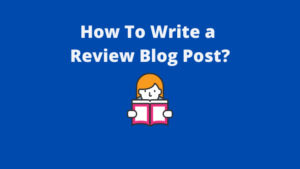

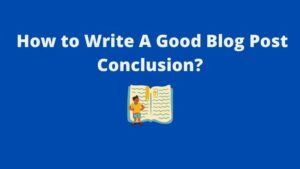
Hi Bhagwant,
This blog post nicely defines how to write a neat and lucid introduction to a blog post. It is well-explained in detail with wonderful formulas that will help people to apply to their blogs for a well-organized content delivery.
Thanks Gayathri for your appreciation
Pingback: How To Write A Good Blog Post Conclusion? | StartBlogPro
Pingback: How To Write A Listicle Blog Post? | StartBlogPro
Pingback: How To Write An Interview Blog Post? [Template Included] | StartBlogPro
Pingback: How To Write A Review Blog Post That Sells Itself? | StartBlogPro
Pingback: Practical Guide to Blog Formatting for SEO | StartBlogPro